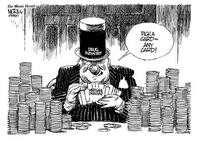The Conservative Left and the Liberal Right
The Conservative Left and The Liberal Right: A contradiction? Or the clearest way to describe two minorities influencing political policy. One of those minorities is fighting for survival; the other is enjoying complete dominance.
The Liberal Right bears little resemblance to its conservative roots. Its neo-conservatism ideal rejects the small-government foundation of the Republican platform. This party is concerned with liberal immigration policies, liberal foreign policies, liberal fiscal policies, liberal trade policies, and liberal tax policies. Moral outrage drives the popularity of this party, while moral legislation is non-existent.
The Conservative Left breaks from many of the ideas of their liberal counterparts. Moral responsibility coupled with social policies is the foundation of this emerging group. Though a Conservative Left is a fundamental Democrat, they break on various issues including abortion, immigration (illegal), and fiscal responsibility. The Conservative Left revolves around health care, balanced budgets, conservative foreign policies, conservative immigration policies, and conservative trade policies.
In today’s political atmosphere it is necessary to reevaluate what each of our political beliefs are. More importantly, understanding how we differ will add to the political diversity this country was founded on.







